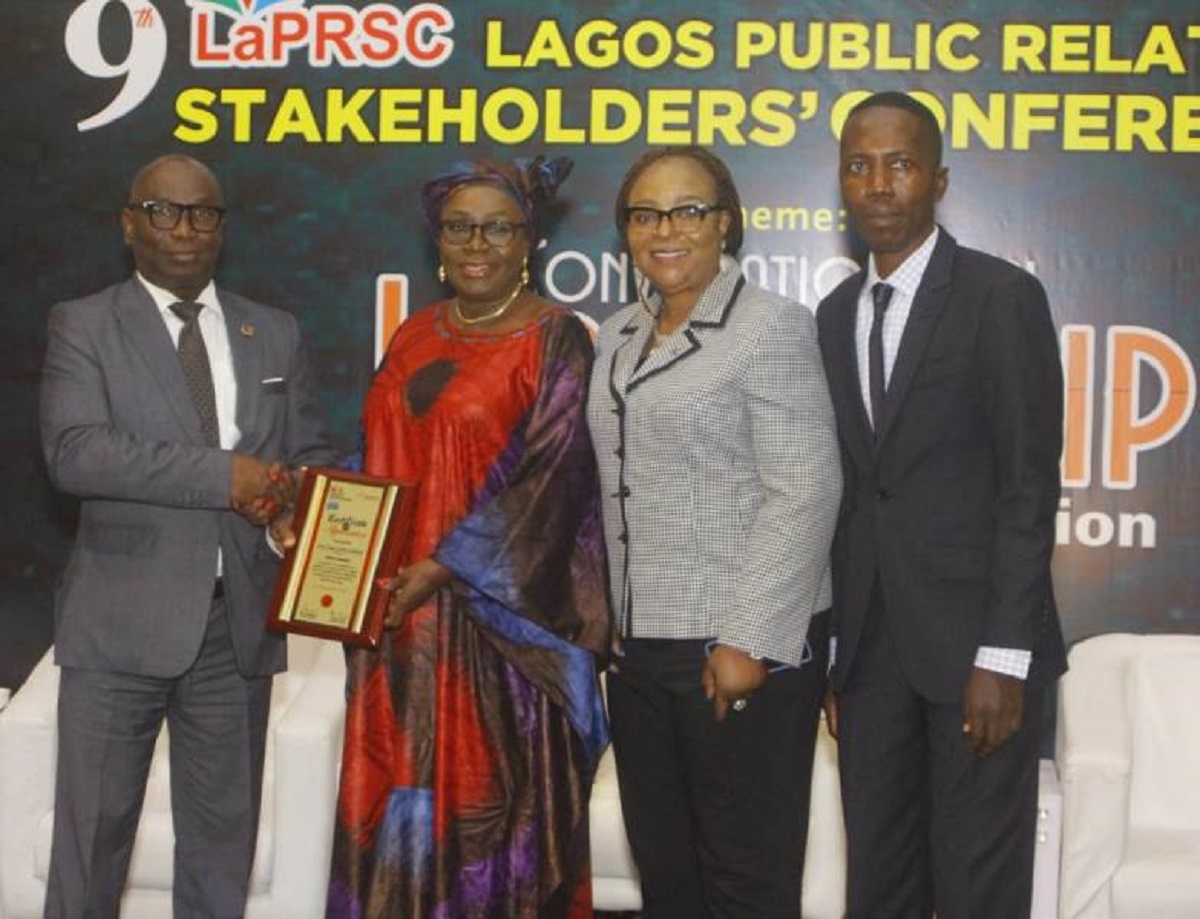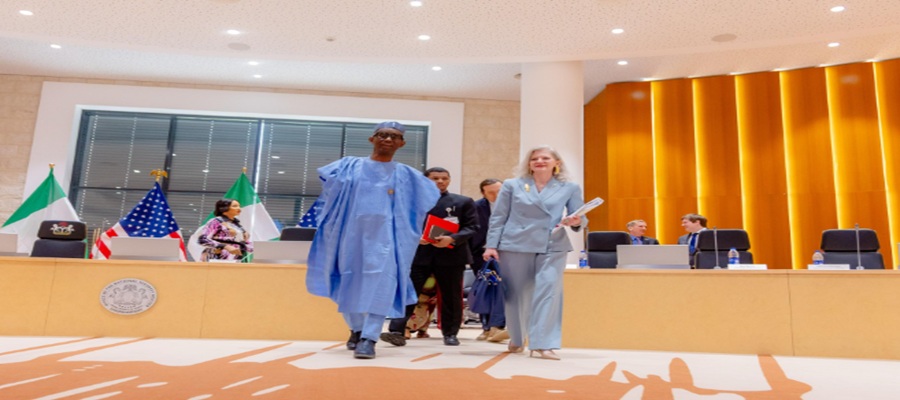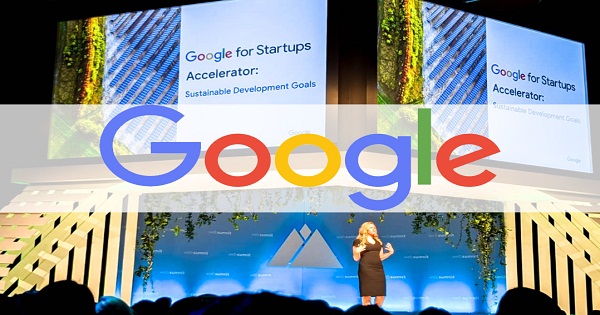General News
LaPRSC: Danbatta Highlights Why Nigerians Must Explore Opportunities in the Digital Economy to Eradicate Poverty

Professor Umar Garba Danbatta, Executive Vice Chairman/ CEO, Nigerian Communications Commission, on Thursday addressed the 9th Lagos Public Relations Stakeholders’ Conference on Leadership and Poverty Eradication.

L-R: Mr Sina Thorpe, Council Member, NIPR; Mrs Nnena Ukoha, Head, Corporate Communications, NCC: Mrs Comfort Obot Nwankwo, Chairman, NIPR Lagos and Conference Convener, Mr Olabamiji Adeleye, Lead Consultant, Addefort Limited at the 9th Lagos PR Stakeholders’ Conference on Leadership and Poverty Eradication on Thursday August 18, 2022.
The EVC, represented by Mrs Nnena Ukoha, Head, Corporate Communications, called on Nigerians to explore opportunities in the Digital Economy to eradicate poverty in the country.
Speaking on the topic, Poverty Eradication in Nigeria: Leveraging Opportunities in a Digital Economy, he noted that ”For most developing countries, particularly those with large populations, inadequate infrastructure has made it difficult to participate as equal partners in the worldwide enterprise of knowledge production and dissemination.
“This portends an unequal distribution of access, resources and opportunities in this new economy, the Digital Economy.
“To avert the birth of a new type of poverty (Information Poverty), the ICT gap (digital divide) between the developed and developing nations must be bridged.”
That Nigeria like most developing nations is not enjoying the full benefits of the ICT revolution due to inadequate telecommunication infrastructure, capacity to maintain existing infrastructure, and policies for equitable public participation as producers and consumers of information and knowledge.
“A nation’s development is measured in economic terms such as per capita income, Gross Domestic Product (GDP), and Gross National Product (GNP), among other indices. Indices such as level of literacy, social development, human capital development, cultural innovation and technological preparedness are not regarded as a measure of development. If we must tap into the ICT revolution, then it is time for a paradigm shift! The traditional economic terms are not a reflection of the new age of the Digital Economy “he said.
On efforts made by the Nigerian government, “There are several past and ongoing efforts by the Nigerian Government to alleviate poverty through ICT using organizations and programmes like the National Information Technology Agency (NITDA), using the offices of the Nigerian Postal Service (NIPOST) across the country as ICT hubs, the Universal Service Provision Fund (USPF) to ensure that telecommunications services are accessible to the widest number of people (and communities) at affordable prices.
USPF has poverty-reducing activities like the Community Resource Centers, USPF Hackathon, RUBI – Rural Broadband Initiative, UnICC – University InterCampus Connectivity, BTS – Base Transceiver Stations, IRC – Information Resource Centres, SKC – School Knowledge Centres, and the E-Health Project. “
The EVC said that “NCC will continue to support the vision of the present government to put Nigeria amongst the top twenty in the comity of Nations and to align our developmental goals in keeping with the seventeen United Nations Sustainable Development Goals (SDGs) but particularly the goal to eradicate extreme poverty for all people everywhere which is currently measured as people living on less than $1.25 a day, by year 2030.
He listed initiatives at the NCC directly or indirectly target poverty eradication to include;
“Advanced Digital Appreciation Programme: Transforming the Academics: Advanced Digital Appreciation Programme for Tertiary Institutions, ADAPTI is aimed at bridging the digital divide existing in academia with the provision of computers and other ICT facilities to equip the lecturers and other experts in order to improve ICT skills and also to enrich the students.
“The overriding objective of this intervention has been to elicit the pervasive application of ICT skills in academia for enhanced staff output, institutional efficiency, and student enculturation to e-based learning for sustainable national growth.”
“Digital Awareness Programme (DAP): this is a special intervention programme to address the digital information knowledge gap in the country, especially among the teeming youthful population. On the last count, the DAP Project supports 229 Secondary Schools across the Six (6) Geopolitical Zones of Nigeria, including the Federal Capital Territory.
“The strategy in this programme is to expose schools and colleges to Information and Communications Technology (ICT) awareness, usage and application by facilitating access to ICT tools by the provision of twenty one (21) Desktop Computers, Local Area Network, Printers, Scanners, VSAT Dish and deployment of one Year Bandwidth Subscription for Internet Access.”
“NCC- Digital Bridge Institute (DBI) Projects: Nigeria’s ICT flagship institution, the Digital Bridge, DBI, came into existence in 2004 to impact on the national ICT human capital building efforts by bridging the ICT knowledge gap.”
“Frequency Auction: Contributing to National Purse: The Nigerian telecom regulator has contributed to the Federation Account from proceeds of frequency auctions and licensing.
“The frequencies auctioned, are in turn used for the deployment of services for poverty reduction and the benefit of the citizenry. The Commission has a clear understanding of this value chain and is determined to uphold it. “
“Value Added Services (VAS): Telecommunication has given birth to several value-added services that open up benefits to all cadre of people irrespective of location and level of education.
“These VAS are great channels for revenue generation. Some VAT are content development, Phone repair network, IT device accessories sales market (phone pouches, screen covers etc), Ringback tones, and even government agencies providing service on telecom platform e.g NAFDAC – drug authentication code. “
On broadband and poverty , “The Nigerian National Broadband Plan 2020–2025 (the “Broadband Plan”) devotes an entire section to targets, strategies and roadmaps to promote pervasive broadband deployment, increased broadband adoption, usage and availability to all at affordable prices.
“These all point to government’s commitment to harmonizing and utilizing the benefits derivable from ICT for the good of all. “
“In 2020, the latest National Broadband Plan was approved to foster fuller economic exploitation of ICTs. This means that there will be more pervasive deployment and usage of ICT to push the development and economic attractiveness of the nation.”
He assured that The Federal Government of Nigeria is committed to sustainable development of the ICT subsector for the growth of the economy and the eradication of poverty.
“This was made evident during the just concluded Communications sector retreat where the Ministry of Communications and the agencies under it converged to chart a five-year plan that would make communications services, affordable, accessible, and available to all persons in Nigeria.”
He concluded that “The credit for Nigeria’s ambitious broadband pursuit is traced to the potentials and prospects of broadband technology, the ease of deployment and the vast opportunities available through it.
“The Commission will continue to put strategies in place to pursue last mile deployment of broadband. This would ensure small businesses are positioned to compete globally and communities and individuals are able to create wealth through access to ICT.”
“By providing access to information, making markets more efficient, fostering social inclusion, and equalizing opportunities in rural areas, ICT offers an innovative and unprecedented tool to directly reduce poverty.”
Other speakers at the event include; Founder and Chairman, Heirs Holdings, Mr Tony Elumelu; Mr Segun Ajayi-Kadir, Director General, Manufacturers Association of Nigeria (MAN); Sheila Ojei, Director Strategy, Funding and Stakeholders Management, LSETF; The Commissioner for Women Affairs and Poverty Alleviation, Lagos State, Mrs Cecilia Bolaji Dada and Dr Oluseye Ajuwon, Economist and Consultant, University of Lagos.
General News
Nigeria Treats Religious Violence as Attack on State – NSA Ribadu

National Security Adviser Nuhu Ribadu has said the federal government considers religious violence an attack on the Nigerian state, stressing that the protection of all citizens, regardless of faith, is non-negotiable.

According to presidential spokesperson Bayo Onanuga, Ribadu made the remarks in Abuja at the close of a US–Nigeria Joint Working Group session.
“Nigeria is a deeply plural society, and the protection of all citizens, Christians, Muslims, and those of other beliefs, is non-negotiable,” Ribadu said.
“Violence framed along religious lines is treated as an attack on the Nigerian state itself.”
In a follow-up post on X, Ribadu said the joint working group has recorded “tangible operational gains” in the fight against terrorism.
The working group was set up following Nigeria’s designation as a Country of Particular Concern (CPC) by US President Donald Trump, a label that often triggers policy actions aimed at ending severe violations of religious freedom.
At the meeting, Ribadu led Nigeria’s delegation, which included representatives from 10 ministries and agencies, while the US delegation, made up of eight federal agencies, was led by Allison Hooker, US under-secretary of state.
Ribadu said Nigeria-US security cooperation has moved from dialogue to action, resulting in the disruption of terrorist networks and transnational criminal groups. He also praised the US for supplying drones, helicopters, platforms, spare parts, and other support systems over the past five years.
Speaking at the session, Hooker said the US was committed to expanding its partnership with Nigeria, particularly on deterring violence against Christian communities.
“Today, we are here to discuss how we can work together to deter violence against Christian communities, prioritising counter-terrorism, insecurity, investigation of attacks, and holding perpetrators accountable,” she said.
She added that efforts would focus on reducing killings, forced displacement, and abductions of Christians, especially in Nigeria’s north-central states
General News
PalmPay User Shares Experience on Fintech Apps to Trust in Nigeria

For many Nigerians, fintech apps are judged by one simple question: Can I trust the platform? For Happiness, a young Nigerian entrepreneur, the answer manifested in the most defining moments of her life.

Trust Built Through Everyday Use
In 2025, Happiness relied on PalmPay to run her business, from receiving customer payments, paying vendors, and managing daily transactions. During PalmPay’s Hustle Grant Campaign, she joined thousands of small business owners hoping to win the N500,000 funding.
While she didn’t make the shortlist, the campaign gave her business something just as valuable: visibility. New customers discovered her brand, enquiries increased, and sales followed.
PalmPay didn’t just host a campaign; it created an ecosystem where small businesses could be seen and supported.
Just days later, Happiness’ life changed. On August 30, 2025, she lost her father. With this loss came challenges, especially payments. They tried transferring money through regular banks but were met with declined transactions. Happiness suggested using her PalmPay account and it was successful.
In a moment defined by loss and urgency, PalmPay cut through the chaos, proving that reliability isn’t a feature, it’s a lifeline. Happiness’ relationship with PalmPay didn’t stop at transactions. Through other management tools on the app, she learned to build discipline around her finances.
More Than an App, a Financial Partner
Beyond transactions, PalmPay’s tools helped Happiness build better money habits and financial discipline. Today, the brand continues to reward reliability through initiatives like its ongoing Premier Cool campaign, reinforcing a simple message: consistency should come with value.
The idea is simple: Purchase a bar of soap and stand a chance to get ₦10,000cash and other cash benefits.
It’s PalmPay’s way of saying that smart money habits deserve real value in return.
Why PalmPay Earns Trust
Life doesn’t give warnings before it tests you. When it does, you need a platform that doesn’t just usually work but always works.
For many users, PalmPay proves to be more than a payment app. It is a trusted partner powering ambitions, supporting users through defining life moments, while helping them bank smartly.
When it mattered most, PalmPay worked. To watch the full testimonial visit: @palmpayapp_ng
General News
Nigerians Target Self-Improvement, Business Startups in 2026 Google Data

Google Search data from the first two weeks of 2026 reveals Nigerians are prioritising ambition, self-growth, and entrepreneurial ventures as they embrace the new year with renewed drive for personal and professional excellence.

The data shows a 40 per cent spike in searches related to self-improvement and “becoming better”, reflecting a nationwide shift from mere resolutions to actionable plans across boardrooms, classrooms, and homes. Entrepreneurship leads the charge, with “how to start a business” topping “how to start” queries after an 80 per cent surge, alongside rising interest in blogging, podcasting, and YouTube channels to foster economic opportunities.
Personal development dominates, as searches for “how to be a better person” rose 20 per cent, extending to relationships with queries on becoming better lovers, partners, husbands, wives, and listeners. Health resolutions gain traction, with 40 per cent increases in “how to eat healthy”, “healthy diet”, and “how to meditate” underscoring commitments to physical vitality and mental wellness.
Skill mastery captivates diverse audiences, from “how to improve English” and communication skills to enhancing memory, credit scores, and even handwriting, while leisure pursuits spike in “how to get better at” chess, singing, running, Fortnite, and soccer. Top searches include “how to improve communication skills”, “how to be a better listener”, and entrepreneurial starters like “how to start a podcast”, painting a portrait of a nation honing edges for success.
Taiwo Kola-Ogunlade, Communications and Public Affairs Manager for West Africa at Google, described the trends as a “powerful reflection of Nigeria’s collective ambition”, affirming the company’s dedication to tools like Search and Gemini for guiding Nigerians toward prosperity

 E-Financial3 days ago
E-Financial3 days agoZenith Bank Gets Regulatory Approval for Full Takeover of Paramount Bank

 Telecom3 days ago
Telecom3 days agoNew Investment Fund Targets Acceleration of Emerging Technology in Nigeria

 E-Business3 days ago
E-Business3 days agoFirm Detected a Fivefold Surge in QR Code Phishing Attacks in the Second Half of 2025

 News3 days ago
News3 days agoNITDA Commits to Digital Inclusion for Persons with Disabilities

 General News2 days ago
General News2 days agoPalmPay User Shares Experience on Fintech Apps to Trust in Nigeria

 News2 days ago
News2 days agoStakeholders Demand Stronger Governance and Infrastructure to Drive Tech Adoption @ Lagos AI Summit

 General News2 days ago
General News2 days agoNigerians Target Self-Improvement, Business Startups in 2026 Google Data

 General News2 days ago
General News2 days agoHow Inside Jobs and Policy Shocks Trigger Nigeria’s Rising Loan Crisis

























